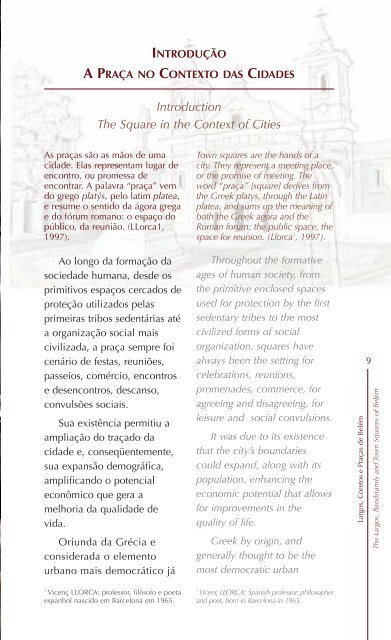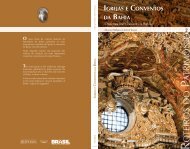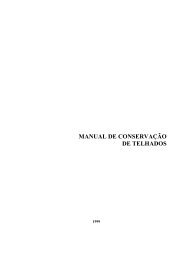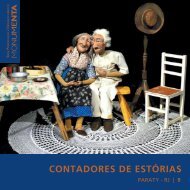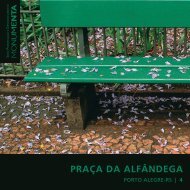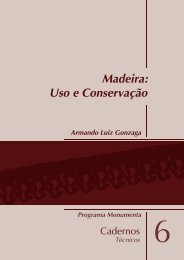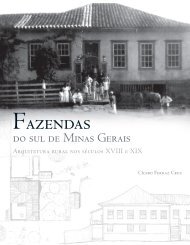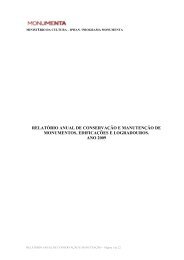LARGOS, CORETOS E PRAÇAS DE BELÉM - Monumenta
LARGOS, CORETOS E PRAÇAS DE BELÉM - Monumenta
LARGOS, CORETOS E PRAÇAS DE BELÉM - Monumenta
You also want an ePaper? Increase the reach of your titles
YUMPU automatically turns print PDFs into web optimized ePapers that Google loves.
Ao longo da formação da<br />
sociedade humana, desde os<br />
primitivos espaços cercados de<br />
proteção utilizados pelas<br />
primeiras tribos sedentárias até<br />
a organização social mais<br />
civilizada, a praça sempre foi<br />
cenário de festas, reuniões,<br />
passeios, comércio, encontros<br />
e desencontros, descanso,<br />
convulsões sociais.<br />
Sua existência permitiu a<br />
ampliação do traçado da<br />
cidade e, conseqüentemente,<br />
sua expansão demográfica,<br />
amplificando o potencial<br />
econômico que gera a<br />
melhoria da qualidade de<br />
vida.<br />
Oriunda da Grécia e<br />
considerada o elemento<br />
urbano mais democrático já<br />
INTRODUÇÃO<br />
APRAÇA NO CONTEXTO DAS CIDA<strong>DE</strong>S<br />
Introduction<br />
The Square in the Context of Cities<br />
As praças são as mãos de uma<br />
cidade. Elas representam lugar de<br />
encontro, ou promessa de<br />
encontrar. A palavra “praça” vem<br />
do grego platýs, pelo latim platea,<br />
e resume o sentido da ágora grega<br />
e do fórum romano: o espaço do<br />
público, da reunião. (LLorca1,<br />
1997).<br />
1 Vicenç LLORCA: professor, filósofo e poeta<br />
espanhol nascido em Barcelona em 1965.<br />
Town squares are the hands of a<br />
city. They represent a meeting place,<br />
or the promise of meeting. The<br />
word “praça” [square] derives from<br />
the Greek platys, through the Latin<br />
platea, and sums up the meaning of<br />
both the Greek agora and the<br />
Roman forum: the public space, the<br />
space for reunion. (Llorca 1 , 1997).<br />
Throughout the formative<br />
ages of human society, from<br />
the primitive enclosed spaces<br />
used for protection by the first<br />
sedentary tribes to the most<br />
civilized forms of social<br />
organization, squares have<br />
always been the setting for<br />
celebrations, reunions,<br />
promenades, commerce, for<br />
agreeing and disagreeing, for<br />
leisure and social convulsions.<br />
It was due to its existence<br />
that the city’s boundaries<br />
could expand, along with its<br />
population, enhancing the<br />
economic potential that allows<br />
for improvements in the<br />
quality of life.<br />
Greek by origin, and<br />
generally thought to be the<br />
most democratic urban<br />
1 Vicenç LLORCA: Spanish professor, philosopher<br />
and poet, born in Barcelona in 1965.<br />
Largos, Coretos e Praças de Belém<br />
9<br />
The Largos, Bandstands and Town Squares of Belém


